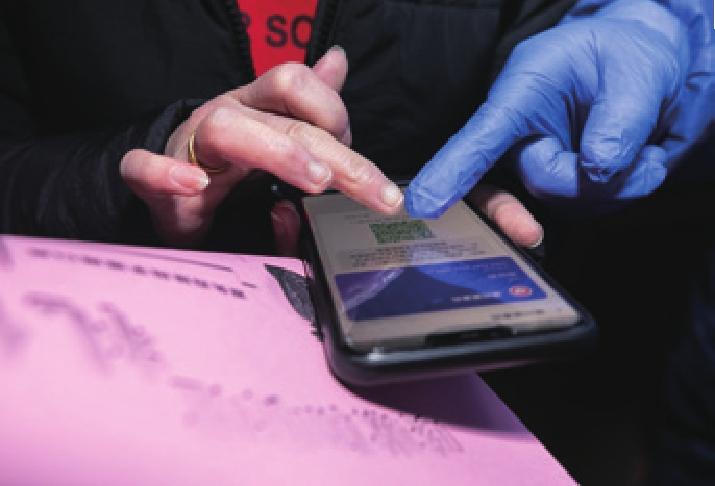A Silver Lining
By Li Xiaoyang

For the Chinese people still confined to their homes due to the novel coronavirus epidemic, working and studying from home and visiting museums online, which were not popular till a couple of months ago, have become common practices. Although the epidemic has forced many industries to shut down temporarily, the rising demand for services based on the Internet and new technologies is pushing China toward a smarter society.
Since the demand for online services has surged, emerging online platforms have rushed to expand the consumer base. Fresh food delivery, remote work, online education and medical services, as well as games and videos have witnessed unprecedented growth. Facing great challenges, many offl ine sectors are also turning to online platforms and new technologies to weather the diffi culties. Some museums, bookstores and even car and property sellers have adopted virtual reality (VR) technologies and livestreaming to boost sales, which has created new business modes.
As Zuo Kairui, a senior engineer with the China Academy of Information and Communications Technology, suggests, digitalization has gained more importance and is applied in more areas during the epidemic prevention and control.
“Since new technologies such as 5G, cloud computing and the Internet of Things have been applied more widely, Chinas digital and real economy can be further integrated to drive social and economic growth,” he told Beijing Review.
Embracing opportunities
Although the epidemic has had a huge impact on the service, manufacturing and trade sectors, especially consumer industries such as tourism, catering and entertainment, it has benefited industries such as e-com- merce, online entertainment and games, as well as medical services, according to a report published by the Shanghai Institutes for International Studies.
Since many people have continued online shopping, e-commerce platforms, especially those for food delivery have remained busy. UU Runner, a delivery service platform, told Dahe.cn that consumer demand for cooked food, foodstuff and medical products such as masks has greatly increased. According to Pinduoduo, a social e-commerce giant, sales of home-use products such as pajamas, cookers, cosmetics, stationery and indoor exercise equipment have also enjoyed a burst of growth.
Besides shopping online, many people spend time playing games, watching videos and livestreaming at home. Data from Chinas tech giant Tencent shows that Honor of Kings, one of its video games, witnessed transactions of around 2 billion yuan ($285 million) by players on January 24, the Chinese New Years Eve, up from 1.3 billion yuan ($185 million) on the same day last year.
Providers of remote services such as remote work, online education and online medical consultations have also received a massive boost due to surging demand. As health inquiries have skyrocketed during the epidemic outbreak, Internet-based medical enterprises such as Ali Health of Internet giant Alibaba and WeDoctor backed by Tencent have taken center stage, providing free online consultations and livestreams by experts and medicine delivery services to reduce the need for travel by buyers.
According to Ali Health, it received nearly 400,000 visits during the fi rst 24 hours after its free consultation service was launched online on January 24. Data from WeDoctor shows that its free consultation platform had over 86.89 million visits from January 23 to February 5, with 18,776 physicians offering medical consultation services to 986,100 visitors.
“During the epidemic control, many hospitals have tried online consultation platforms which help ease the pressure of offl ine medical institutions,” Chen Qiaoshan, a healthcare analyst at Beijing-based market consultancy Analysys, told China.org.cn, stressing that telemedicine will become more widely used in the next two or three years, especially in regions where medical resources are insuffi cient.
The scale of Chinas telemedicine market stood at 13 billion yuan ($1.8 billion) in 2018 and is expected to grow at a compound annual rate of 27.63 percent in the next five years. The market is expected to reach 34.5 billion yuan ($4.9 billion) in 2022, according to CIConsulting, a Shenzhen-based consulting company.
Online medical platforms are only part of the tech fi rms standing out in the epidemic prevention and control period. Services such as checking flights with infected people and reporting health conditions have also boomed. According to the fintech firm Ant Financial, over 100 cities in China used the health QR codes of its mobile app Alipay from February 12 to 19. With the QR codes, patients no longer need medical treatment cards when going to hospitals and healthy people can pass checkpoints without filling in paper health reports, which reduces face-to-face contacts and improves work effi ciency.
Seeking innovation
While emerging industries are enjoying new opportunities in this special period, traditional industries are seeking ways out by expanding online services and adopting new technologies, through which many offline businesses have revived their sluggish sales growth.
Since selling goods through livestreams has become popular, many offline outlets have followed the trend to attract potential consumers. Although the epidemic outbreak brought the sales of Shanghai-based cosmetics brand Forest Cabin down by 90 percent in six days in late January, the brand has reemerged through livestreaming on Taobao, Alibabas online marketplace. On February 15, its sales turned 45 percent higher than the amount in the same period last year.

Farmers are also taking advantage of livestreaming to promote local agricultural products. As Wang Xirong, a farmer in Dandong, Liaoning Province in northeast China, found it hard to sell her strawberries this year, she has turned to livestreaming to boost sales online.
“Consumers can see the strawberries in the greenhouse and place orders anytime. The sales volume of my Taobao store in one single day can reach as high as 18,000 kg,” she told China News Service. To support farmers, e-commerce platforms such as Taobao and Pinduoduo have improved logistics to transport fresh products, with local governments also lending a helping hand.
Empowered by VR technologies and livestreaming, traditional industries such as furniture, car and real estate are also doing online promotions as offline sales cool down. Easyhome, a domestic home improvement chain, is one of those resuming business through livestreaming on Taobao. From February 6 to 8, a total of 136 outlets under the brand conducted over 1,000 livestreams, attracting nearly 700,000 viewers and receiving over 40 million yuan ($5.7 million) in orders.
Home buyers and renters can now view the interior of buildings without traveling around. Data from 58.com and housing information platform Anjuke.com shows that the proportion of online VR house visitors went up by 57.7 percent month on month in January. Tang Lin, a real estate agent in Guangxi Zhuang Autonomous Region in south China, told China Securities Journal that his livestreams of houses attract around 60,000 viewers every time. This new, more effi cient business mode is likely to become a long-term trend in the real estate industry.
According to a report released by market consultancy iiMedia Research last year, Chinas livestream users may reach 524 million by 2020. As consumers demands upgrade, the market players need to provide targeted services in niche sectors and turn to new technologies such as 5G to improve effects and attract viewers.
Turning crises into chances
The special demands during the epidemic outbreak have boosted online industries and equipped traditional businesses with digital wings. However, whether the industries can achieve sustainable growth and weather the difficulties remains a concern. For online market players such as fresh food retailers and remote work platforms, retaining users can be a problem after the epidemic ends.
Cui Lili, Executive Director of the Institute of E-Commerce at the Shanghai University of Finance and Economics, stressed that the focus should be on the long-term benefits.“Although platforms such as fresh food retailers may lose some customers after the epidemic, they can still take the opportunity to expand the consumer base and sharpen their competitive edge,” she told Beijing Review.
Generated in the special period, some new demands may last and create more opportunities for domestic enterprises. Consumers are currently focused on health, green products and remote services, which has resulted in more health-related supplies and further application of artificial intelligence, Wang Jianming, a professor with the Zhejiang University of Finance and Economics, told Economic Daily.
According to Wang, Chinas consumption structure has improved due to the changes in demand. “Consumption of entertainment services and products for personal pleasure has declined, while the spending on education, telecommunication and healthcare has increased,” he said.
The emerging new demands suggest that the potential of Chinas consumer market remains to be further explored and rebounds can be expected after offline consumption gradually resumes, Fan Rizhao, a researcher with Pinduoduo, told Economic Daily.

